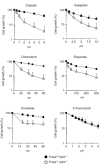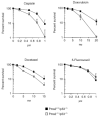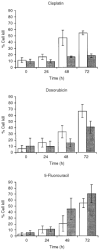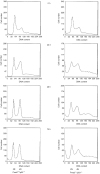Increased sensitivity of p53-deficient cells to anticancer agents due to loss of Pms2
- PMID: 12434296
- PMCID: PMC2364320
- DOI: 10.1038/sj.bjc.6600599
Increased sensitivity of p53-deficient cells to anticancer agents due to loss of Pms2
Abstract
A large fraction of human tumours carries mutations in the p53 gene. p53 plays a central role in controlling cell cycle checkpoint regulation, DNA repair, transcription, and apoptosis upon genotoxic stress. Lack of p53 function impairs these cellular processes, and this may be the basis of resistance to chemotherapeutic regimens. By virtue of the involvement of DNA mismatch repair in modulating cytotoxic pathways in response to DNA damaging agents, we investigated the effects of loss of Pms2 on the sensitivity to a panel of widely used anticancer agents in E1A/Ha-Ras-transformed p53-null mouse fibroblasts either proficient or deficient in Pms2. We report that lack of the Pms2 gene is associated with an increased sensitivity, ranging from 2-6-fold, to some types of anticancer agents including the topoisomerase II poisons doxorubicin, etoposide and mitoxantrone, the platinum compounds cisplatin and oxaliplatin, the taxanes docetaxel and paclitaxel, and the antimetabolite gemcitabine. In contrast, no change in sensitivity was found after treatment with 5-fluorouracil. Cell cycle analysis revealed that both, Pms2-deficient and -proficient cells, retain the ability to arrest at the G2/M upon cisplatin treatment. The data indicate that the concomitant loss of Pms2 function chemosensitises p53-deficient cells to some types of anticancer agents, that Pms2 positively modulates cell survival by mechanisms independent of p53, and that increased cytotoxicity is paralleled by increased apoptosis. Tumour-targeted functional inhibition of Pms2 may be a valuable strategy for increasing the efficacy of anticancer agents in the treatment of p53-mutant cancers.
Figures




Similar articles
-
Loss of atm sensitises p53-deficient cells to topoisomerase poisons and antimetabolites.Ann Oncol. 2003 Jun;14(6):938-45. doi: 10.1093/annonc/mdg240. Ann Oncol. 2003. PMID: 12796033
-
The effect of loss of Brca1 on the sensitivity to anticancer agents in p53-deficient cells.Int J Oncol. 2003 May;22(5):1169-73. Int J Oncol. 2003. PMID: 12684687
-
P53 modulates the effect of loss of DNA mismatch repair on the sensitivity of human colon cancer cells to the cytotoxic and mutagenic effects of cisplatin.Cancer Res. 2001 Feb 15;61(4):1508-16. Cancer Res. 2001. PMID: 11245458
-
Mechanisms controlling sensitivity to platinum complexes: role of p53 and DNA mismatch repair.Curr Cancer Drug Targets. 2003 Feb;3(1):21-9. doi: 10.2174/1568009033333727. Curr Cancer Drug Targets. 2003. PMID: 12570658 Review.
-
The role of DNA mismatch repair in drug resistance.Clin Cancer Res. 1998 Jan;4(1):1-6. Clin Cancer Res. 1998. PMID: 9516945 Review.
Cited by
-
MTHFR Knockdown Assists Cell Defense against Folate Depletion Induced Chromosome Segregation and Uracil Misincorporation in DNA.Int J Mol Sci. 2021 Aug 30;22(17):9392. doi: 10.3390/ijms22179392. Int J Mol Sci. 2021. PMID: 34502300 Free PMC article.
-
Stabilization of mismatch repair gene PMS2 by glycogen synthase kinase 3beta is implicated in the treatment of cervical carcinoma.BMC Cancer. 2010 Feb 23;10:58. doi: 10.1186/1471-2407-10-58. BMC Cancer. 2010. PMID: 20178594 Free PMC article.
-
The genome of the naturally evolved obesity-prone Ossabaw miniature pig.iScience. 2021 Sep 3;24(9):103081. doi: 10.1016/j.isci.2021.103081. eCollection 2021 Sep 24. iScience. 2021. PMID: 34585119 Free PMC article.
-
Brostallicin (PNU-166196)--a new DNA minor groove binder that retains sensitivity in DNA mismatch repair-deficient tumour cells.Br J Cancer. 2003 Oct 20;89(8):1559-65. doi: 10.1038/sj.bjc.6601316. Br J Cancer. 2003. PMID: 14562032 Free PMC article.
-
The Immunome of Colon Cancer: Functional In Silico Analysis of Antigenic Proteins Deduced from IgG Microarray Profiling.Genomics Proteomics Bioinformatics. 2018 Feb;16(1):73-84. doi: 10.1016/j.gpb.2017.10.002. Epub 2018 Mar 2. Genomics Proteomics Bioinformatics. 2018. PMID: 29505855 Free PMC article.
References
-
- AebiSKurdi-HaidarBGordonRCenniBZhengHFinkDChristenRDBolandCRKoiMFishelRHowellSB1996Loss of DNA mismatch repair in acquired resistance to cisplatin Cancer Res 5630873090 - PubMed
-
- BlandinoGLevineAJOrenM1999Mutant p53 gain of function: differential effects of different p53 mutants on resistance of cultured cells to chemotherapy Oncogene 18477485 - PubMed
-
- BrownRHirstGLGallagherWMMcIlwrathAJMargisonGPvan der ZeeAGAnthoneyDA1997hMLH1 expression and cellular responses of ovarian tumour cells to treatment with cytotoxic anticancer agents Oncogene 154552 - PubMed
-
- BrownMJWoutersBG1999Apoptosis, p53, and tumor cell sensitivity to anticancer agents Cancer Res 5913911399 - PubMed
Publication types
MeSH terms
Substances
LinkOut - more resources
Full Text Sources
Other Literature Sources
Research Materials
Miscellaneous

